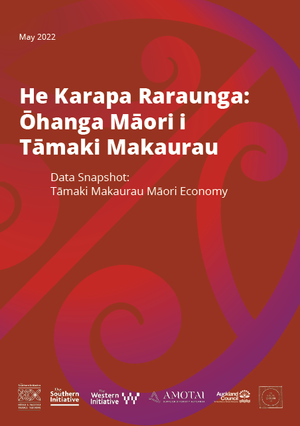Data snapshot: Tāmaki Makaurau Māori economy
Author:
Tze Ming Mok, Kahurangi MalcomSource:
Auckland Council | The Southern Initiative, TSIPublication date:
2022Topics:
MāoriHe karapa raraunga: Ōhanga Māori i Tāmaki Makaurau Data snapshot: Tāmaki Makaurau Māori economy
Extract:
Summary
Good news about Māori business in Tāmaki Makaurau
- Tāmaki Makaurau Māori businesses are punching above their weight.
- In 2020 Māori businesses that had a known regional council area contributed an estimated $6bn as ‘value added’ to national GDP, in terms of business profits and paying workers.
- Tāmaki Makaurau Māori businesses contributed 26% of this, although were only 22% of the businesses.
- Tāmaki Makaurau Māori business GDP contribution as a percentage of their income was outperforming non-Māori businesses in seven industries in 2020, including areas with strong Māori-owner presence such as construction, healthcare and social assistance, electricity, water, gas & waste, and transport, postal & warehousing.
- Tāmaki Makaurau accessed the Covid-19 wage subsidy at the same rate as non-Māori businesses.
- Riding out the post-GFC period may have resulted in the surviving Māori businesses in Tāmaki Makaurau becoming more resilient than before.
Warnings For Tāmaki Makaurau
- Māori business in Tāmaki Makaurau are still particularly vulnerable to looming recession or economic shocks.
- Māori businesses have suffered disproportionately from recessions and economic crises in the past.
- The Global Financial Crisis hit Māori businesses hard, and since then Māori business growth has stalled.
- The gap between Māori and non-Māori businesses in Tāmaki Makaurau is widening.
- There are only 5.5% more Māori businesses in Tāmaki Makaurau than there were in 2010, compared to 25% for non-Māori.
- Māori businesses in Tāmaki Makaurau are employing 11% fewer workers than they were in 2010, compared with 42% more for non-Māori.
- We can expect that many Māori businesses in industries that were doing well in 2020 will have taken hits from Covid-19, such as the previously high-performing accommodation and hospitality industry. There are also likely grim times ahead for many industries due to the supply chain crisis, housing market correction, labour shortages, and skills shortages.
- Key supports during the Covid-19 response period excluded the big urban centres, meaning that struggling Māori business in Tāmaki Makaurau missed out. We cannot afford to repeat this pattern.
What We Need To Do
- Invest in training, entrepreneurship and recruitment pipelines: This will help maximise Māori business opportunities and the Māori talent pool in high-value sunrise sectors and the green economy.
- Improve business support delivery: Better coordination of fragmented services is needed so that Māori businesses, especially small ones, have one ‘front door’ to access support.
- Make business investment fair: We need data-driven targets or quotas so that Māori businesses have equitable access to business support funding, such as the Regional Business Partner grants. We also need to make sure that Māori businesses in Tāmaki Makaurau are adequately prioritised for business support, and not overlooked by regionally-targeted funding.
- Leverage social procurement: Supplier diversity and workforce procurement targets are a big new development for Māori business. But for the majority of Māori businesses to make the most of these business-to-business opportunities, there needs to be more coordination and funding of small business support across diverse sectors, so they can engage with procurement processes, including registering with Amotai, the national supplier diversity intermediary. ...
May 2022
